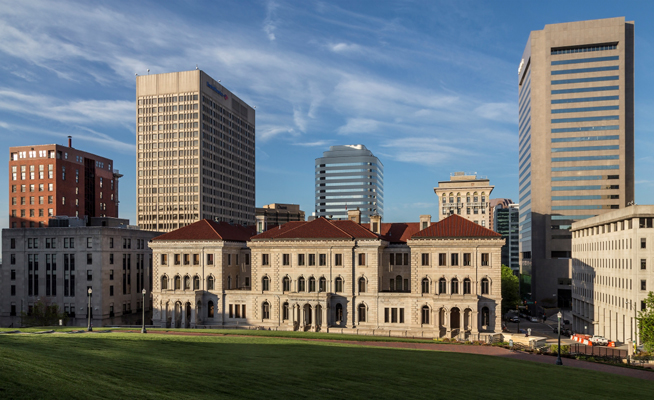As part of U.S. President Biden’s Investing in America agenda, the General Services Administration (GSA) recently awarded over USD 10 million to select windows made of low embodied carbon (LEC) glass to be featured in an existing renovation project at the Lewis F. Powell Jr. U.S. Courthouse and Annex buildings in Richmond, Virginia, USA.
Vitro Architectural Glass is pleased to announce that its Solarban® 60 solar control low-e glass was selected by the GSA for the Powell Courthouse and Annex renovations. Solarban® 60 glass meets one of the limits (top 40 percent) established in GSA’s IRA Low Embodied Carbon Material Requirements for flat glass. Additionally, Solarban® 60 glass meets the courthouse’s efficiency, performance, and aesthetic needs while generating fewer emissions from manufacturing, with a third-party verified global warming potential (GWP) of 1,350 kilograms of carbon dioxide equivalent per metric tonne, which is 6 percent lower than North America’s flat glass industry standard figure.
With its ability to transmit 70 percent of the available visible light while blocking 62 percent of the sun’s heat energy, Solarban® 60 glass offers year-round comfort for occupants, significant energy savings and a clear, colour-neutral appearance.
Vitro’s production teams have taken several significant steps to lower embodied carbon generated during glass production, which is challenging because flat glass manufacturing makes up more than 75 percent of the GWP of double-pane insulating glass units (IGUs).
Strategies to lower embodied carbon include using batch material more efficiently, implementing furnace control systems to reduce the variability of melting temperatures and fuel consumption, adding low-NOx burners and variable frequency drives on cooling fans to reduce energy use, installing energy-efficient LED lighting and driving supplier improvements.
A highlight of these efforts is Vitro’s pioneering use of oxy-fuel technology at three plant locations in the U.S. Vitro’s patented oxy-fuel furnace technology melts glass raw materials such as sand and silica carefully, mixing pure oxygen (instead of air) with natural gas, significantly improving our energy and environmental performance. This technology and process reduces energy consumption in glass-melting furnaces by as much as 20 percent, cutting greenhouse gas emissions in half.





